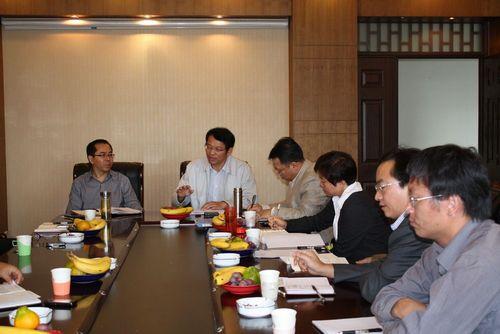In a symposium held recently on university internationalization, Secretary Mr. Wang delivered a significant speech. He required all institutions to improve their practical understanding about running a school internationally and to further strengthen the base of university internationalization. In the meantime, university leaders must emancipate their minds and grasp the preemptive opportunities which will allow YUFE to develop into a country leading, internationalized financial university.
Secretary Mr. Wang said we must actively adapt ourselves to the great trends of education internationalization instead of holding to the past. When internationalization work has been carried to a new stage, ways of working will need to be shifted and managerial patterns will need to be adjusted for areas such as post-graduate study, undergraduate study, financial affairs, teaching affairs, and rear services, etc. Problems will be settled through system reforms, management innovations and teaching method readjustments. Administration processes for students admission, approval and examination will need to be strengthened in order to guarantee the brand quality of YUFE. He emphasized that education internationalization is a job that involves all intuitions from the bottom-up. Therefore, each school and academic institution will need to carry out practical activities in line with the development of internationalization. All functional departments will be required to qualify themselves for dealing with international educational institutions and overseas students.
Secretary Mr. Wang also pointed out that one characteristic that will distinguish us from other financial universities in China will be our relatively high level of international education. Thus, the university must unremittingly extend university influence to neighboring countries and develop YUFE into a country-leading internationalized financial university. He said we need to improve the overall level of education and teaching through internationalization. Internationalization is far more than creating a few Sino-foreign joint education programs or hosting some Southeast Asian students. It is a long term and gradual process that strives for a brighter prospect of universities and a better environment for teachers and students. It is a determined effort to attract more foreign schools and colleges to cooperate and exchange with the university. Consequently, leaders, and mid-level leaders in particular, need to stand at this global height to consider relevant issues.
He made it clear that education internationalization is one of the main goals for the university s future development. Whether the goal can be sustained or not is greatly reliant on the self-consciousness of all teachers and administrators. The upcoming working conference on university education will be the first general meeting on international cooperation and communication. The purpose of the conference is to unify ideas and understandings, identify the strategic goals of internationalization work for the next 5 to 10 years, and drive the internationalization process through improved teaching standards. He emphasized the need to create an international course criteria with YUFE characteristics suitable for both domestic and overseas students. By drawing on, but not slavishly following, the western course criteria, we can create course criteria of our own. He asked the university to localize its course content and make efforts to form a disciplined course system offered in English.
Secretary Mr. Wang paid particular attention to keeping internationalization safe and sound. He summed up the lessons and experience gained in international education in the last few years. He stated that only when we have a good understanding of the existing problems, can we reform systems, set goals and formulate concrete measures to fix them. All staff and students, especially mid-level leaders, should have a full understanding of the goals of university internationalization. They must understand the economic and political risks of internationalization. Thus, they will be able to succeed in managing risk and furthering university development.

During the symposium presided over by Vice President Yin Hong, leaders from the Accounting Office, Office of Teaching Affairs, Academic Research Office, Student Affairs Office, International Business School , ASEAN School, School of Information and Technology and School of Foreign Languages put forward suggestions concerning internationalization work. The directors of the International and Exchange Office introduced the current status of internationalization work and gave replies to relevant questions.
Related News
- Vice President Yinhong Visits Vietnam
- Foreign Expert Does Voluntary Work in Four Primary Schools
- Delegation from Edinburgh Napier University Visits our University
- Teachers and students from SISU participated in the spring 2010 tree-planting activities in Chongqing and attended the launch ceremony for the establishment of a national eco-garden city
Photos
More>>history
Traditions
- A Delegation from Mercer University, USA Visited CQMU
- Regional Director of HEC Mantreal International Projects Visited CQMU
- Dr. Hue H. Luu from Chicago University, USA visited CQMU
- The First International Chongqing Orthopaedics Forum & the 2nd Chongqing
- Director of Cincinnati Children's Hospital Visited Children's Hospital of CQMU
arts
- Guests from Flinders University, Australia Visited Nursing School of CQMU
- Introduction Meeting about the Joint 1+2 Nursing Program Was Held
- Expert from Cincinnati Children's Hospital Medical Center Visited Children's
- Hungarian Consul General Visited Chongqing Medical University
- Vice President International of York University Visited CQMU





